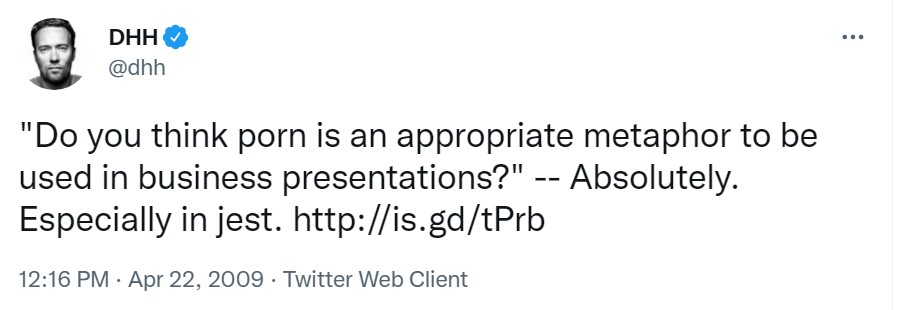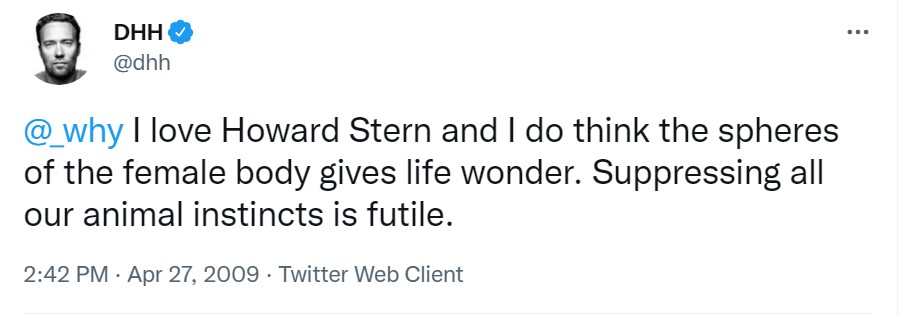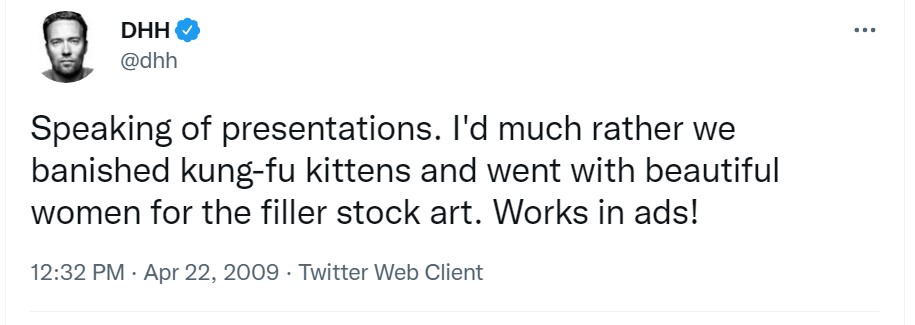2023 update:
In 2023, I find I disagree with this, completely. I do think that corporations hiring known bigots reflects poorly on the corporation.
Earlier
Second Update Andrew Sullivan in The Hounding of a Heretic:
Will he now be forced to walk through the streets in shame? Why not the stocks? The whole episode disgusts me – as it should disgust anyone interested in a tolerant and diverse society. If this is the gay rights movement today – hounding our opponents with a fanaticism more like the religious right than anyone else – then count me out. If we are about intimidating the free speech of others, we are no better than the anti-gay bullies who came before us.
Update: Mozilla caved to pressure. This was not a good decision. It was a cowardly decision.
We had a chance to have a mature, thoughtful discussion on what freedom really means, diversity—even if being diverse means working with people who don’t agree with you—and the importance in establishing boundaries between company direction and personal choice.
We had that opportunity, and we spit it all away.
Earlier
I’m writing about corporate actions vs. personal belief. No, I’m not writing about the Hobby Lobby Supreme Court case, at least not yet. I’m writing about Brendan Eich being named as CEO of the Mozilla Corporation.
Appointing Eich isn’t altogether a surprise. After all, Eich was a co-founder of the Mozilla organization. He has been CTO for years. He’s also known as the father of JavaScript, which should give him some street cred among techs. I’m not sure how his business acumen is, but I haven’t heard any Wall Street type yell out, “Oh god, oh god, we’re doomed!”
Eich’s appointment, though, has come with more than a fair share of controversy, and none of it is related to anything he’s done at Mozilla. It has to do with what Eich did, as an individual, several years ago.
California has a law where donations to political causes have to be reported. I’m not sure of all the particulars, but it sounds like a good law. In 2008, Eich donated to the Proposition 8 campaign. Proposition 8 was the initiative to make gay marriage illegal in California. Unfortunately, the law passed; fortunately, it hit a Constitutional wall.
Because of California’s reporting laws, Eich had to report his donation, as well as list his employer, Mozilla. The report went unseen for many years until 2012, when it generated a Twitterstorm of moderate proportions (after all, he’s a geek, not a reality TV show star). The storm died down, as these storms invariably, do.
Now, Mozilla has named Eich as CEO, and the storm, she is a blowing once again. Mozilla app developers are promising a boycott. Employees are asking Eich to step down. Pundits are writing heartfelt and soulful contemplations about the act.
And I don’t agree with any of them.
I have been and will continue to be a supporter of gay rights and marriage equality. I shouldn’t have to preface my reason for supporting Eich by saying this, but such is the environment with which we now hold discourse—we have to shield ourselves with righteousness just so we can safely have our say.
Appointing Eich as CEO to Mozilla is not a slap to the gay community—it’s a corporate action most likely taken for any number of reasons, in which Mozilla launching a new anti-gay movement is not one of them. I’m comfortable saying this because I’ve known Mozilla since the day this organization first started making ripples in the tech community. There are very few organizations as open, and as inclusive, as Mozilla. Mozilla’s own employees demonstrate this by coming out on Twitter, expressing their unhappiness at Eich being appointed. Not many companies have a culture such that employees ask a CEO step down because they don’t agree with his personal actions.
Personal actions. I can think of no act more intolerant than the one that does not allow individuals to express their own political views.
Brendan Eich donated to the Proposition 8 campaign. When I first heard this news, I was disappointed. Surprised, too, because I’m like so many others in the tech community in assuming we all share the same core principles. How shocking to find out, though, that among the tech community members I know, some don’t support gay marriage, some don’t like President Obama, and many are hard core libertarians. A few even teeter into Tea Party territory.
In other words, for all the homogeneity of the audiences at tech conferences, we are actually a rather diverse crowd. And diversity doesn’t always mean diversity our way.
I was personally disappointed in Eich’s donation, but it did not impact on my view of Mozilla. Why should it? He wasn’t donating as an employee of Mozilla. He wasn’t representing Mozilla. He was donating as a private citizen. Last time I heard, we respect this sort of thing in the US. Don’t we?
And now he’s been made CEO, and his past donation as an individual to one campaign I don’t agree with still doesn’t impact on my view of Mozilla. What Mozilla does, as an organization, influences what I feel about the organization: not what one employee believes, personally.
This situation isn’t the same thing as the Hobby Lobby court case, where the owners consider their business to be a reflection of their personal views. More than that: consider their business to be an extension of their personal views. This situation also isn’t the same as a bakery refusing to provide a cake for a gay wedding, or a pizza corporate CEO attempting to use his company as a way to undermine Obamacare. These actions were all the actions of leadership seeking to entwine personal views with corporate identity, and doing so aggressively.
Mozilla is Mozilla. I do not expect Eich to someday state that Mozilla is coming out against gay marriage. Neither will he allow his personal belief to negatively influence corporate culture because it has not done so for the last six years. Remember that Eich made the donation in 2008, but Mozilla has somehow managed to survive to this day, still open, still inclusive.
(Speaking of which, if you’re not going to develop apps for the company today, why didn’t you refuse to do so yesterday? Or last year? It was the same company then. He had enormous influence then. Do you expect his appointment as CEO is somehow going to rip down the rainbows over night?)
Leah Libresco wrote in the American Conservative that “Balkanized businesses, which only hire employees or leaders that are politically palatable to their donors and customers aren’t economically or socially efficient.” She also wrote:
If the gay rights movement wants to change Brendan Eich’s mind, it’s to their advantage to keep him enmeshed in mainstream culture; after all, gay friends and acquaintances are one of the strongest predictors of support for same-sex marriage.
Sometimes you can influence people more by positive actions than negative. After all, thanks to this thoughtful piece, I’ve now actually linked a story from the American Conservative.
I wish Eich the best of luck in his new position, as long as he doesn’t allow it to detract him too much from his work with JavaScript.
I also hope that all the openness and inclusiveness among so many Mozilla workers, floats up.
Update: Brendan Eich’s response.



